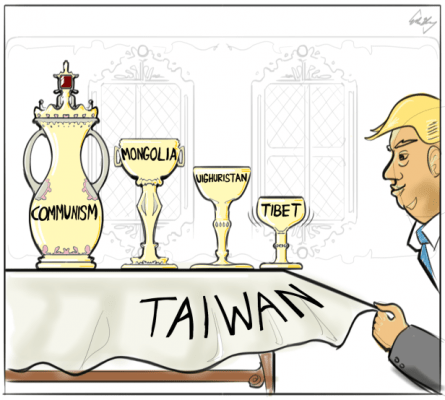
The Report
A South China Morning Post report says that some retired Chinese military leaders have suggested the United States is not in a position to defend Taiwan at present because all four of its aircraft carriers in the Indo-Pacific have been hit by Covid-19 outbreaks. There is a rising nationalistic sentiment, with calls for Beijing to act on the self-ruled island. Qiao Liang, the co-author of the book Unrestricted Warfare China’s Master Plan to Destroy America sounds a note of caution. As per him “China’s goal is not the reunification of Taiwan, but to achieve the dream of national rejuvenation – so that all 1.4 billion Chinese can have a good life. Could it be achieved by taking Taiwan back? Of course not. So we should not make this the top priority. If Beijing wants to take Taiwan back by force, it will need to mobilize all its resources and power to do this….You shouldn’t put all your eggs in one basket, it’s too costly….its (USA’s) military strength is reduced … however it just creates a short tactical window….not big enough to solve the strategic dilemma it (china) will face in the future…Chinese economy was still heavily reliant on the US dollar… war over Taiwan would be a massive economic blow for China that would see capital flooding out of the country and many companies being forced to closed….would just be a huge price to pay”.
Remarkable. Interesting. Revealing. A good part of China wants to use this window of opportunity and annex Taiwan. Can they do it? What are the costs involved? Let us build a scenario to capture Taiwan and see how it can play out.
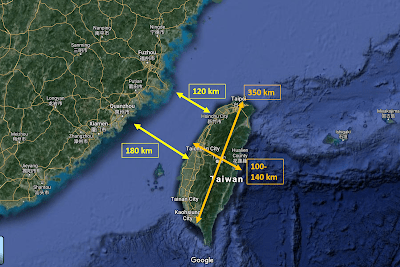
Basics
Taiwan is approximately a 350 km long and 100 – 140 km broad island, 120-180 km away from mainland China. It is heavily populated, urbanized and developed to the West. The East is mountainous, consisting mostly of five rugged mountain ranges parallel to the east coast with several peaks over 3,500 m. Chinese military operations must develop from the West only. These will be amphibious / airborne operations in some combination. Such operations were last carried out by UK during the Falkland’s War. In scale, the operations would fall somewhere between the ‘Dieppe Raid’ and ‘Operation Overlord’ with some elements of ‘Market Garden’ thrown in. Complicated is an understatement.
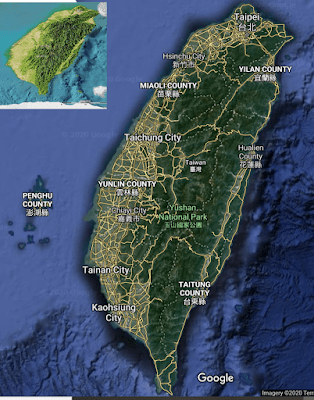
A Plan
What does it involve? Phase 1. Carry out preparation and mobilization without compromising secrecy. Phase2. Isolation of Taiwan. Deploy a naval screen along the orange line (see map) beyond Taiwan to block reactions from USA, South Korea and Japan and control airspace beyond that. Deploy Air Defense assets on mainland. PLAN will be fully at sea. Phase 3. Carry out degradation of Taiwan Armed Forces with Missiles, Air Force and Navy. Carry out deception activities to hide intended landing sites. Phase 4. Carry out an amphibious or an airborne assault to secure multiple beach / air heads. Phase 5. Break out from successful beach /air heads to capture areas in depth. Phase 6. Reinforce additional troops through captured beach/air heads. Consolidate and eliminate pockets of resistance. Open a logistics route by capture of a major seaport / airport. It is a deliberate plan devoid of any great surprise. All these actions and phases need dedicated assets which cannot be double tasked. Further China will have to deploy adequate forces on its other borders. They cannot be wished away.
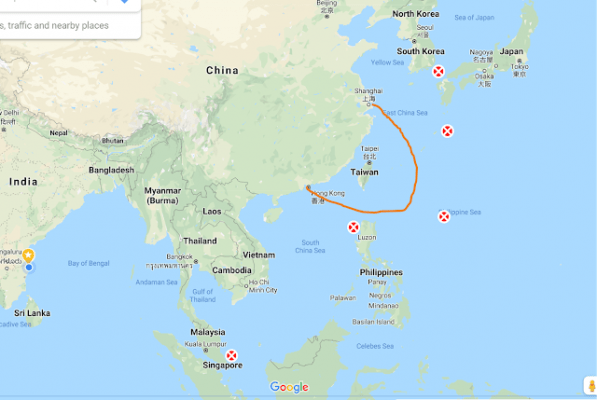
Scenario Unfolded
We will assume that China is successful in keeping the nuclear angle out. USA will react. South Korea, Japan and Australia might react. Hence, they must be confronted and kept at bay. So a set of naval and aerial encounters over the Yellow Sea, East China Sea, Philippines Sea and South China Sea are inevitable. These will extend aerially to the mainland. China would have to employ considerable firepower to degrade Taiwans Armed Forces. There will be retaliation from Taiwan. Preemptive attacks by Taiwan to dislocate the preparations cannot be ruled out. The Chinese will have to launch their assaults (amphibious or airborne) from 2-3 mounting bases and converge on to the chosen beaches/ airheads where it is feasible to land. After all it will be based on weather, slope, tide, exit areas etc etc. There will be no surprise whatsoever. All assaults will be unidirectional from the West only. The Taiwanese will be waiting at the available beach heads for the Chinese assault troops. Many such plans are available even on the internet also (see below). Disruption of assault echelons and landing craft will commence at sea by the Taiwanese simultaneously. All break outs will be fighting break outs through urban areas. Operations in depth will be in fully urban terrain and built up areas. All fancy things like AI, Cyber etc are mostly out of the equation once the shooting starts and blood starts flowing.
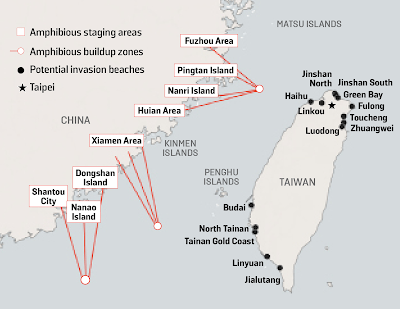
Action
If the Taiwanese put up even a semblance of a fight the Chinese will have their hands full. I do not see why that should not happen since the Taiwanese are well equipped, armed and trained. They spend around 11 billion dollars annually on defense. They have a substantial reserve element (much like Israelis) which will be mobilized. The Chinese might have force preponderance. However deployability is restricted to the Bridge heads/ air heads. Hence there will be force parity when the shooting starts. Once hand to hand / street to street combat starts, all the missiles and air forces and naval forces will mean for nothing. It will be true grit and nothing more. All this time, the naval screen is at battle at sea.
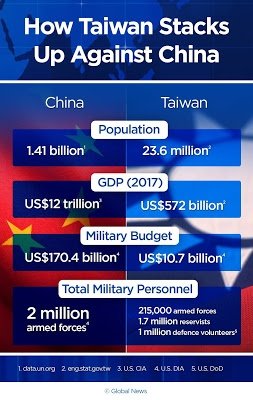
Fall Out and Collaterals
Take it further. China eventually subdues Taiwan and conquers the Island. What will be the fall out? Taiwan in a rubble? Fair call I suppose. A fair part of Chinese mainland will also be in rubble. That is core and thickly populated Han areas which China show cases as developed with industry, power plants, nuclear reactors, infrastructure et al. In effect we are looking at a lot of economic junk. Complete benefit of Taiwanese cross strait economic linkages would be destroyed. That is about 150 Billion USD annually. Chinese forces will be weakened as the battle progresses. Meanwhile US carrier groups will recover from the Virus and will get into the scene to alter force ratios. By the way, we have not factored any US sub lurking in the vicinity to take its toll on PLAN. This illustrative scenario can be varied, and outcomes debated. That is a matter of opinion.
Next. Do the Chinese have the training, expertise, and capability to carry out the most complicated form of operations? I doubt. We are talking of an Armed Force in which training (lack of it) and corruption have gone hand in hand. Look at the latest White Paper on Defense (excerpts below). Weeding out corruption is part of their internationally stated agenda! There have been reports of fudging training. We are also talking of a conscript Armed Force who is not fully fired up to join forces. Call it what you may. The overall quality of the Chinese Armed Forces is hugely suspect, and I have full reason to believe that the Chinese Armed Forces will crumble under pressure by determined opposition.
There are other collaterals. For the entire duration of this operation, there will be no mercantile activity in and out of China. Beyond that the USA, Japan, South Korea, Australia and India in some combination will keep mercantile activity out of China. Philippines, Vietnam, Indonesia and Malaysia will not keep quiet. They will nip and cut. After all China has not been kind to them. At some point China will run out of gas. There will be almost zero economic activity in China. Put a time frame on this entire sequence of events and assess for yourself where it will leave China. I might have missed out on some finer issues due to lack of ground knowledge.
What of issues beyond? For quite some time Chinese Forces will have limited capability. Tibet, Hong Kong, and Xinjiang can put up their flags of revolt to compound issues. The isolated base in Djibouti becomes fair game and vulnerable. In the ensuing international situation some of the African Countries which are in a debt trap and are upset by newfound Chinese racism could well nationalize the BRI assets just like Egypt nationalized the Suez Canal.
Eggs in a Basket
Qiao Ling was right. China cannot put all eggs in one basket. In my opinion China might not have enough eggs in the first place to put in the Taiwanese basket. We also need to remember that the Chinese equipment is of suspect quality just like their masks and test kits. The clear evidence and input are that the Pakistanis did not use the JFs in their riposte to Balakot. They relied on F16s only. They were not confident of JFs, which were used in support roles only. Also, Rand Corporation had analyzed that China gets stronger militarily when in proximity of its mainland. That was in the context of a China – US scenario. It will be interesting if this scenario is gamed and modeled out on a realistic basis.
In all this we should also not forget that the Chinese Virus is still raging and will continue for some time. Economy not revived. 80 million jobs lost and unrest in the air. International opinion heavily against China. It is one thing to continue funding the Armed Forces to expand at present. It will be another thing to rebuild a depleted Armed Force after loss of face. They can get to know how it feels from their Pakistani friends who are well experienced in this after repeated failures. There is a real threat to the Chinese system. The Communist Party might keel over.
The question then is – why is nationalism being hyped in China for capture of Taiwan? Is it a concerted effort to divert public opinion away from the internal instability in China and the threat to the current authoritarian regime? Is a national fixation on display? Is it in sync with aggressive moves in South China Sea? Is it an extension of aggressive and brash Chinese (un) diplomacy? It is also interesting that a hawk who wanted to use any means to defeat USA is now finding out that warfare is not that unrestricted. Wars must be eventually won on a battlefield where blood and guts prevail. And. China might not have it to capture Taiwan. It is also an admission that despite everything, the Chinese know that they cannot match USA even now.
Why?
Why am I dissecting this scenario? Simple. When people in India understand the national fixation of China and put a tag on it, we will understand and appreciate the realistic military threat from China to India. Otherwise we will continue to nationally conjure Chinese ghosts attacking India in hordes. That has a bearing on the way we must transform in the given conditions. That will be analyzed in a subsequent article.
It also confirms what I have always assessed. China is a fat man with short legs and short arms The Chinese Army simply might not have the capability to shed blood anymore. The last major war was a failure. It does not have experience of modern warfare. Most importantly, I do not think the military leadership is capable. If a nation must publish in an international document that there is micro corruption in its armed forces, then its fighting capability is suspect. As I am posting this, I just read a newsclip which said that USS Ronald Reagan is back on station. There closes the window and there ends the gust of hot air from the dragon!
I will be very interested in reactions from Taiwan and USA. Please send it to your friends there.
Excerpts From Chinese White Paper on Defense
Governing the military with strict discipline and in accordance with the law. China’s armed forces are building a military legal system with Chinese characteristics and pressing ahead with a fundamental transformation in how the military is run. They are strengthening oversight and supervision in military training and combat readiness to uproot peacetime ills. They are promoting legal awareness through public communication and education campaigns, establishing and improving the support mechanism of legal consultation and service, and advancing law-based management in the military. China’s armed forces are striving to manage the troops more strictly in all respects. They have fully implemented military rules and regulations, restored and improved the traditional mechanism of using bugles to communicate and command, carried out safety inspections to identify and tackle potential problems, stepped up garrison military policing, strengthened the management of military vehicles by targeted measures, and set up a mechanism of regular notification on garrison military policing. These efforts have contributed to maintaining the positive image of the armed forces.
Improving Party conduct, upholding integrity and continuing the fight against corruption. China’s armed forces are tightening political discipline and rules, investigating and dealing strictly with grave violations of CPC discipline and state laws as in the cases of Guo Boxiong, Xu Caihou, Fang Fenghui, and Zhang Yang. China’s armed forces punish corruption in strict accordance with CPC discipline and relevant laws and rectify any malpractice in key construction projects and the procurement of equipment and material. Points-of-contact for discipline supervision have been designated at the small-unit level to investigate and combat “micro corruption” and misconduct in all its forms among service members. China’s armed forces have intensified political inspection by completing disciplinary inspections and re-inspections over all CMC functional organs, the TCs, services, AMS, NDU, NUDT and the PAP. They have worked to implement full-spectrum audit, intensify the audit of major fields, projects and funds, and perform strict audits over the economic liabilities of officers in positions of leadership. Active efforts have been made to monitor the cost-effectiveness of applied funds, conduct whole-process audit, and combine civil and military efforts in auditing. Since 2012, they have carried out audits over 39,000 units and 13,000 PLA and PAP officers in positions of leadership at and above regiment level. As a result, notable achievements have been made in the fight against corruption in China’s armed forces, and a healthy political atmosphere of integrity has formed.








